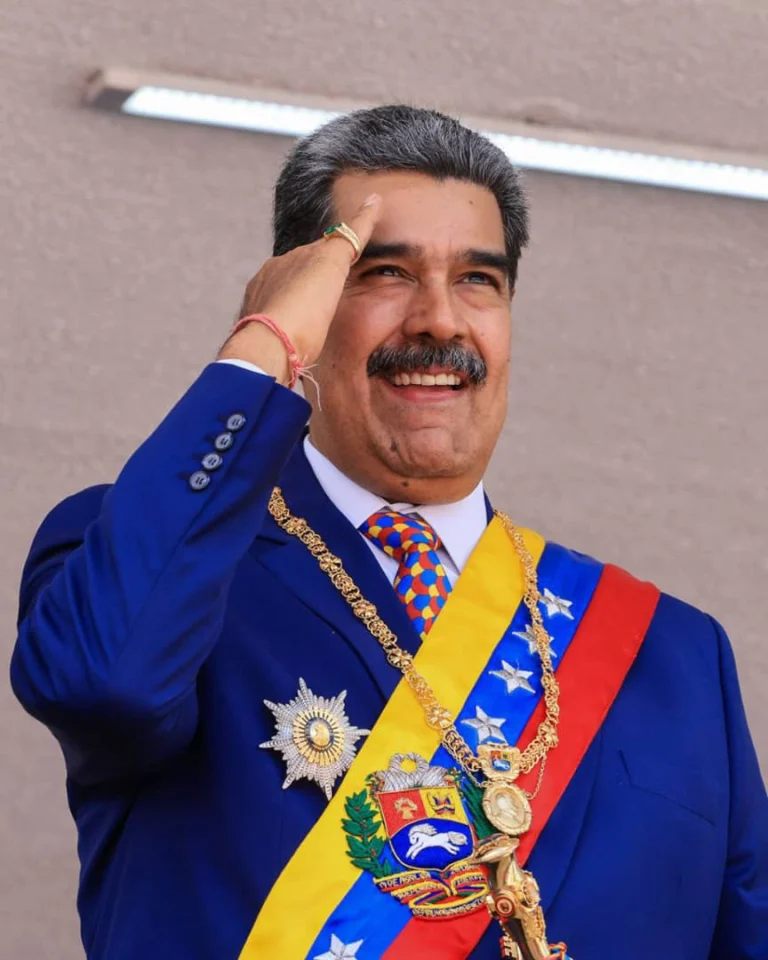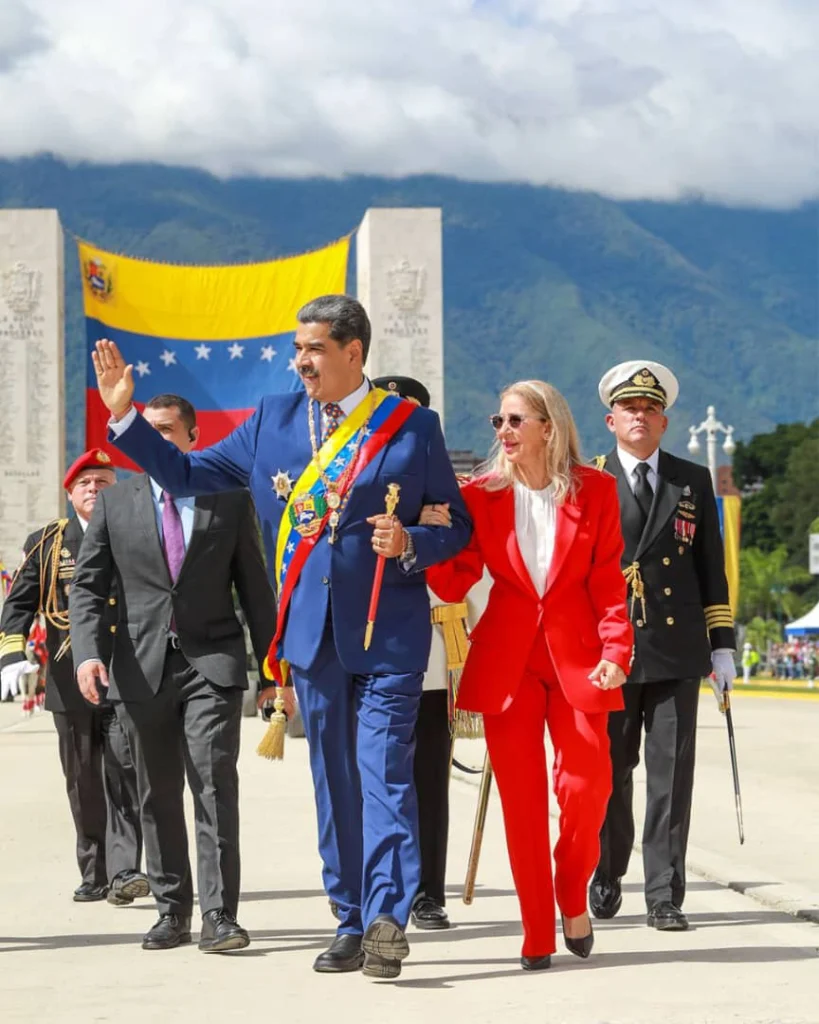🇻🇪 214th Venezuela Independence Anniversary: Maduro Celebrates Sovereignty and Chávez Legacy with Pride

President Maduro celebrates Venezuela’s 214th independence anniversary, 5/7/2025
July 6, 2025 Hour: 8:06 am
President Maduro celebrates Venezuela’s 214th independence anniversary, highlighting national pride, sovereignty, and the legacy of Hugo Chávez amid ongoing geopolitical tensions.
Related: Nicaragua Reaffirms Revolutionary Solidarity with Venezuela on 214th Independence Anniversary
🇻🇪 Maduro Leads Venezuela Independence Anniversary Celebration
On July 5, 2025, Venezuela commemorated its 214th Venezuela independence anniversary with a grand civic-military parade held in Caracas. The event was presided over by President Nicolás Maduro, who also serves as Commander-in-Chief of the Bolivarian National Armed Forces (FANB). Thousands of citizens joined the festivities, showcasing a strong sense of patriotism and national unity.
“I feel immense pride as Commander-in-Chief of the FANB for today’s flawless parade,” said Maduro during his speech, where he also thanked international authorities in attendance. He emphasized the historical significance of July 5, 1811 — the day Venezuela declared independence from Spanish colonial rule — calling it “the birth of a sovereign republic.”
Historical Significance of July 5th
July 5, 1811, marks a pivotal moment in Latin American history when Venezuela became the first country on the continent to formally declare independence from Spain. The Act of Declaration of Independence, signed by 7 congressmen representing the provinces of Venezuela, laid the foundation for a new era of self-governance.
Despite initial setbacks — including the eventual fall of the First Republic in 1812 — the spirit of independence endured. Leaders such as Simón Bolívar and José Félix Ribas continued the fight, ultimately leading to full independence in 1821 after the Battle of Carabobo.
Today, the Act of Independence is not only a symbol of freedom but also a guiding document that continues to inspire modern political discourse in Venezuela, particularly under the Bolivarian Revolution.
🔗 Leer sobre la historia y el significado del 5 de julio en Venezuela
🔗 Detalles históricos de la Declaración de Independencia de Venezuela
The Political Ideology Behind the Commemoration
The celebration of the Venezuela independence anniversary is deeply rooted in the nation’s contemporary political identity. Under the Bolivarian Revolution, initiated by former President Hugo Chávez, the ideals of independence are interpreted through the lens of anti-imperialism, social justice, and popular sovereignty.
During his speech, President Maduro reiterated this vision, urging citizens to study and debate the historic Act of Independence in schools and communities. He described it as “the compass guiding us through this 21st century of struggles and victories.”
This ideological framing reinforces the government’s narrative of continuity with the revolutionary values of the past, while also positioning Venezuela as a leader in resisting foreign intervention and defending national sovereignty.
Hugo Chávez’s Enduring Influence
In a deeply emotional moment, President Maduro paid tribute to the late leader Hugo Chávez, saying: “Here stands your people, on their feet, united in popular, military, and police strength, advancing freely and sovereignly, overcoming conspiracies and aggressions from U.S. imperialism.”
His words were met with thunderous applause and chants of “¡Chávez vive!” echoing throughout the venue. The event reinforced the enduring influence of Chávez’s political ideology, known as Bolivarianism, which continues to shape Venezuela’s governance and foreign policy.
Hugo Chávez, who served as president from 1999 until his death in 2013, remains a central figure in Venezuelan politics. His leadership redefined the country’s economic model, promoted regional integration through organizations like ALBA (Bolivarian Alliance for the Peoples of Our America), and challenged U.S. hegemony in Latin America.
Even years after his passing, Chávez’s image and legacy remain omnipresent in public life, serving as both a source of inspiration and a point of political polarization.
Nicolás Maduro’s Leadership Amid Geopolitical Tensions
President Nicolás Maduro, who assumed office in 2013 following Chávez’s death, has faced significant challenges during his tenure. These include economic sanctions imposed by the United States and parts of the European Union, internal opposition movements, and complex relations with global powers.
Despite these pressures, Maduro has maintained firm control over key institutions and continues to enjoy support from the armed forces and large segments of the population. His leadership style emphasizes continuity with Chávez’s policies, resistance against external interference, and state-led development strategies.
The 214th Venezuela independence anniversary served as a platform for reinforcing this message of resilience and unity, with Maduro concluding his speech with a powerful call to action: “¡Que viva la FANB! ¡Que viva Bolívar! ¡Que viva Chávez!”

Venezuela’s Foreign Policy and Anti-Imperialist Stance
The commemoration of Venezuela’s independence is not just a domestic affair — it also reflects the country’s broader foreign policy orientation. Venezuela positions itself as a defender of multipolarity, opposing unilateral interventions and advocating for South-South cooperation.
Under Maduro’s administration, Venezuela has strengthened ties with countries such as Russia, China, Iran, and Cuba, often positioning itself as a counterweight to Western dominance in international affairs. This alignment has led to increased diplomatic friction with the United States and some European nations.
Nevertheless, Venezuela continues to play an active role in regional organizations like CELAC (Community of Latin American and Caribbean States) and UNASUR (Union of South American Nations), promoting dialogue and integration among Latin American states.
The emphasis on sovereignty, self-determination, and resistance to imperialism during the Venezuela independence anniversary underscores the nation’s strategic posture in a rapidly shifting global landscape.
Executive Summary:
- Venezuela celebrated its 214th Venezuela independence anniversary with a large-scale civic-military parade led by President Nicolás Maduro.
- The event highlighted national pride, sovereignty, and the ongoing legacy of former president Hugo Chávez.
- Maduro called for the preservation and teaching of Venezuela’s historical independence values.
- The commemoration also reflected Venezuela’s current geopolitical stance: anti-imperialist, pro-sovereignty, and aligned with alternative global alliances.
- Despite international pressure, the government maintains strong institutional backing and continues to promote a vision of resistance and self-determination.
Author: JMVR
Source: PrensaLatina

